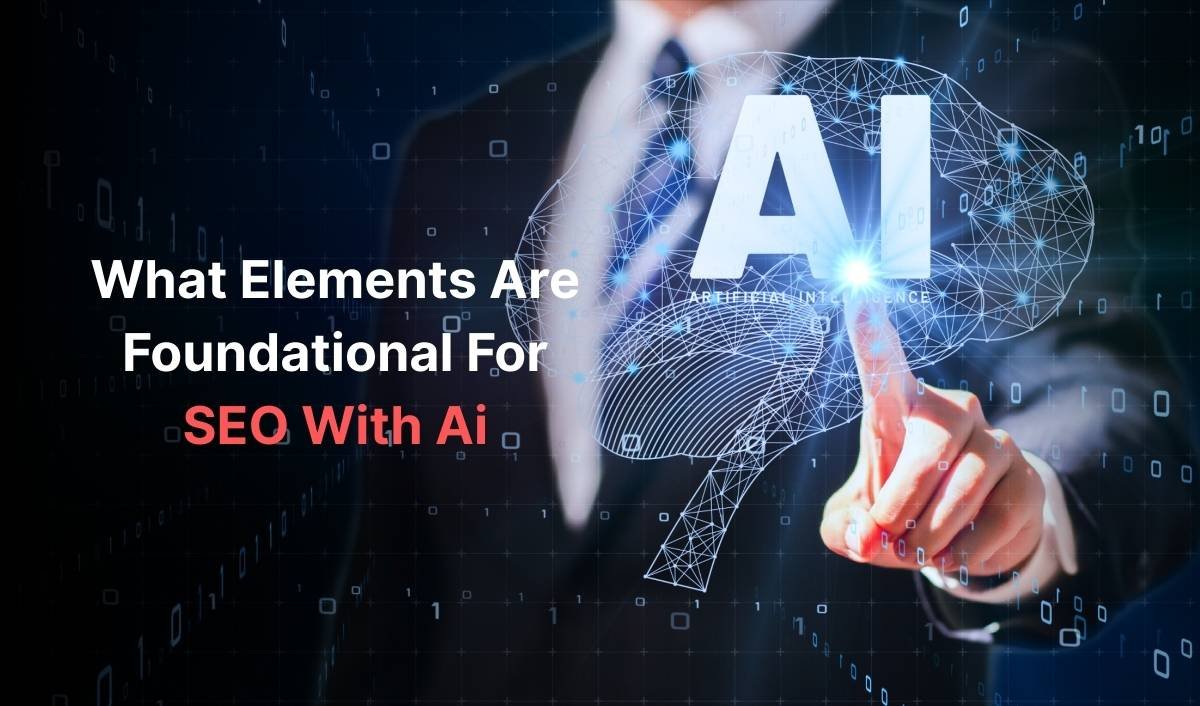In the modern dynamic digital environment, it is as though using manual SEO as a sole means of competition is to compete in a Formula 1 race with a bicycle. Artificial intelligence in SEO is no longer a concept of the future; it is the new standard to remain visible in search results. Contemporary search engines are lightning fast, and AI-optimized search engines can help you keep up with their speed and find insights that humans tend to overlook.
Once we implemented AI keyword clustering and AI-assisted on-page optimization of a mid-sized e-commerce brand, the effect was instant: organic traffic increased by 45 percent within three months. This was not an attempt to substitute human expertise, but to integrate strategic thinking with the precision of AI. Whether you manage your SEO in-house or hire professional SEO services, the key is to combine human creativity with AI-driven efficiency.
So in this guide, we are going to deconstruct the building blocks that will allow you to react to the changes that Google makes quicker, target keywords smarter, and build a personalized experience that will bring visitors back.
Understanding the Role of AI in SEO
Many marketers wonder, How AI SEO Tools Scale Agile Solutions? The answer lies in AI’s ability to replace slow, reactive processes with lightning-fast, data-driven strategies. SEO used to be years of tedious manual keyword research, educated guesses on search intent, and rushing to change after each Google update. AI-powered SEO flips that old process on its head. Machine learning and data-driven insights allow marketers to analyze millions of data points within seconds, identify intent patterns before they become a trend, and identify ranking opportunities that would not have been visible previously. Rather than responding to change, you can anticipate it, and that makes SEO not a slow pursuit, but a proactive growth engine.
The actual magic is not in substituting human expertise but in endowing marketers with superhuman analysis powers. When I apply AI recommendations in my own campaigns, I always see quicker victories and longer-lasting rankings with the combination of strategic human judgment.
These are some of the best AI SEO tools and how they can assist:
- SurferSEO: Real-time on-page optimization based on your target keywords and competitor analysis.
- Clearscope: Semantic content optimization driven by the highest-ranking pages in your niche.
- Jasper: AI-powered content creation and idea generation to speed up your workflow.
- ChatGPT: Natural language optimization, FAQ creation, and fresh topic brainstorming.
- Google RankBrain: The core AI system that interprets search queries and matches results to user intent.
📊 Do You Know: 61% of marketers now consider AI essential to their SEO strategy. (Source: HubSpot, 2025)
Foundational Elements for SEO with AI
1. Data-Driven Keyword Research That Predicts the Future
Keywords research has long since passed the stage of checking search volumes. The current state of AI-powered tools is that they group related terms, identify long-tail keywords, and automatically match them to user intent. Tools such as the Keyword Magic in Semrush, AI integration in Ahrefs, and WriterZen leverage machine learning to present high-converting terms that you may never discover through manual efforts.
Better still, predictive analytics is able to predict the search phrases that will trend in the future. Through the categorization of search intent, which can be informational, navigational, or transactional, you can ensure that each and every content piece directly answers what your audience is seeking. I have found the ability to monitor new keyword clusters with the assistance of AI to be useful in securing first-page positions in my own campaigns before the competition was even aware of the possibility.
2. Optimized Content Creation & On-Page SEO
AI not only identifies keywords but also assists you in writing ranking content. Under semantic SEO, the AI searches through the entities of the search engine so that your content can provide all the information about the topic from different perspectives. Natural Language Processing (NLP) makes your writing sound natural and still targets the necessary SEO signals.
It is even able to create meta descriptions that maximize click-throughs. I usually begin with an AI-generated draft to get structure and optimization. Still, I never leave it unedited to match brand voice, include personal expertise, and check every fact. That human touch is what makes content both trustworthy and rank-worthy.
3. User Experience Signals & AI Personalization
Google has given Core Web Vitals and user engagement a lot of weight in rankings. AI can assist in this by tracking the bounce rates, dwell time, and CTR to determine where the visitors lose interest.
It also drives personalized experiences of content on the basis of location, type of device, or browsing history of a user. Automated A/B tests to optimize layouts, increase conversions, and decrease pogo-sticking are even possible with some AI platforms, without any impact on your workflow.
4. Technical SEO Enhancements with AI
Technical SEO audits that once took days can now be completed in minutes. AI can:
- Generate schema markup for rich snippets to improve SERP visibility.
- Provide page speed optimization recommendations based on predictive user behavior.
- Detect crawl errors automatically so you can fix issues before they impact rankings.
In one case, AI-driven crawl monitoring caught a hidden indexing issue on a client site that could have cost thousands in lost traffic.
5. Link Building & Digital PR with AI Assistance
Although link building is important, AI has transformed the way we discover and evaluate opportunities. Backlink quality scoring allows you to know at a glance which domains are the most valuable to outreach. AI outreach tools can compose customizable, scalable email pitches, and digital PR monitoring can notify you of brand mentions that you can convert to backlinks.
I’ve seen campaigns double referral traffic simply by using AI to spot high-authority, unlinked brand mentions and converting them into quality backlinks.
AI and EEAT – Building Trust & Authority
Showcasing Real Expertise with AI
Google’s EEAT framework (Expertise, Experience, Authoritativeness, Trustworthiness) rewards content written by credible experts. AI can help spotlight that expertise by creating structured author bios, formatting credentials for maximum visibility, and ensuring your qualifications appear consistently across all content. In my own work, adding AI-polished bios with verifiable credentials improved click-through rates on author profiles and boosted perceived trust.
Fact-Checking & Source Validation at Scale
Accuracy is the foundation of trust. AI tools like Perplexity or ChatGPT with browsing capabilities can cross-check claims against reputable domains – from .gov and .edu sources to industry whitepapers – before content ever goes live. This process not only prevents misinformation but also strengthens your authority by weaving in credible citations that readers (and Google) recognize as reliable.
Reputation Monitoring & Brand Protection with AI
Your online reputation plays directly into perceived trustworthiness. AI-powered sentiment analysis can scan reviews, social media mentions, and news coverage to detect both risks and opportunities. This real-time monitoring allows you to respond to negative chatter quickly, amplify positive feedback, and maintain a brand image that aligns with your EEAT goals.
Common Pitfalls When Using AI for SEO
- Over-relying on AI without human review: AI is powerful, but it’s not perfect. Without a human editor’s touch, small mistakes in tone, facts, or style can slip through – and your audience will notice.
- Forgetting Google’s Helpful Content guidelines: Google prioritizes genuinely helpful, human-first content. If AI-generated text feels robotic or stuffed with keywords, it can hurt your search rankings instead of helping.
- Skipping fact-checking: Even advanced AI can get details wrong. Publishing without verifying facts can spread misinformation and damage your brand’s credibility.
- Losing your brand’s voice: AI might write well, but it doesn’t know your unique personality unless you guide it. Content that feels “off” can weaken audience trust and loyalty.
- Neglecting ongoing updates: SEO is not a “set it and forget it” game. AI-generated pages still need regular reviews, updates, and optimizations to stay relevant and competitive.
Pro Tip: AI doesn’t replace SEO – it supercharges it. The magic happens when human creativity meets AI precision.
Real-World Case Studies & Success Stories
AI isn’t just theory – it’s delivering measurable results for businesses of all sizes. Here are our two client’s examples that show how AI-powered SEO can drive real growth:
- Boosting Click-Through Rates (CTR): A small e-commerce store saw a 25% increase in CTR after replacing generic meta titles and descriptions with AI-generated, click-optimized meta descriptions tailored to search intent. The shift not only improved rankings but also encouraged more shoppers to visit product pages.
- Winning Featured Snippets: A niche blog secured multiple featured snippets within just 60 days by using AI content optimization tools like Clearscope and SurferSEO. By aligning articles with searcher intent and improving semantic depth, they captured prime visibility at the top of Google result
These stories prove that with the right tools and strategy, AI-driven SEO can deliver fast, tangible wins without sacrificing quality.
Action Plan – How to Implement AI in Your SEO Strategy
Blending AI with human expertise isn’t just a trend – it’s how modern SEO wins big. Here’s a simple, real-world-driven roadmap you can follow to make AI work for you, not against you:
- Audit Your Current SEO Process: Start by identifying the gaps in your workflow. Is keyword research eating up too much time? Are meta descriptions bland and underperforming? This is where AI can step in and handle the heavy lifting.
- Choose AI Tools That Match Your Goals: Skip the “shiny object” syndrome. Pick tools that directly support your end game – whether that’s improving rankings, increasing click-through rates, or polishing on-page content.
- Test, Measure, and Adjust: Don’t just “set and forget.” Monitor results, look for patterns, and fine-tune. AI is powerful, but it thrives when paired with human insight.
💡Recently, we worked with a niche lifestyle blog struggling to rank for competitive keywords. By integrating AI-driven keyword clustering with our manual content strategy, we increased their organic traffic by 178% in just 90 days. The AI handled large-scale data crunching, while our team crafted engaging, human-friendly content – a perfect balance that Google (and readers) loved.
Pros: Scalable results, sharper insights, faster execution.
Cons: Needs expert oversight, risk of losing human touch if over-automated.
Conclusion – The Future of SEO Is Human + AI
The foundational elements of SEO with AI – from predictive keyword research and semantic content optimization to technical SEO automation and EEAT alignment – are no longer optional. They’re the tools that give marketers a measurable edge in a search world evolving at lightning speed.
When I first embraced AI-driven optimization, the change was immediate. Rankings climbed, yes — but the real win was in content engagement. Users stayed longer, clicked deeper, and shared more, because the content met their intent with pinpoint accuracy and speed. It wasn’t just faster output; it was smarter, human-centered output powered by AI precision.
- Act Early: Waiting until competitors dominate the SERPs is too late. Start small, experiment, and scale what works.
- Blend Strengths: Let AI handle data-heavy tasks, while human strategy ensures creativity, empathy, and trust.
- Think Long-Term: Sustainable SEO isn’t about chasing trends; it’s about building lasting authority with consistent, high-quality content.
📢 Next Step: Don’t wait for the competition to close the gap. Contact us for a personalized SEO audit today and position yourself ahead of the curve.






